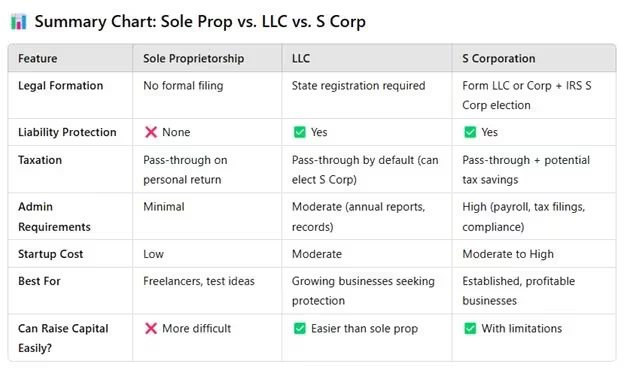What Type of Business Entity is Right for You? LLC/SCorp/SoleProp
%2520(33).avif)
%2520(33).avif)
Note from Dolev Law: This blog is meant to serve as a general guide for educational purposes. Every business is unique, and choosing the right entity can have long-term legal and tax consequences. We always recommend consulting a business attorney or CPA to get advice tailored to your specific situation. With that said, let’s dive in!
Starting a business is exciting—but it also comes with important decisions, including how to legally structure your business. One of the first questions many business owners face is:
Should I be a Sole Proprietor, an LLC, or an S Corporation?
Each option has its pros and cons, and the right fit depends on your goals, liability comfort level, and how you want to be taxed.
Let’s break down the basics:
🧍 Sole Proprietorship: The Simplest Option
A sole proprietorship is the default structure when you start doing business on your own without forming an entity. You don’t have to register anything (beyond local business licenses), and taxes are filed on your personal return.
Pros:
- Easiest and least expensive to set up: No formal filings are required at the state level, making this a fast and budget-friendly option.
- Pass-through taxation: Business income and expenses are reported directly on your personal tax return (Schedule C), keeping tax filing simple.
- Low administrative burden: No need to maintain separate records or hold annual meetings.
Cons:
- No liability protection: You are personally responsible for any debts or legal issues. If your business is sued, your personal assets (like your house or savings) could be at risk.
- Harder to access funding: Investors and banks often prefer businesses that are formally registered as LLCs or corporations.
- Less formal credibility: Some clients or vendors may take your business more seriously if it's an LLC or corporation.
Best for: Freelancers, side hustlers, or anyone testing a business idea before investing heavily.
🏢 LLC (Limited Liability Company): Popular and Flexible
An LLC is a formal legal structure that separates your personal and business life. It’s a favorite among small business owners due to its balance of simplicity, flexibility, and protection.
Pros:
- Personal liability protection: Your personal assets are generally protected from business debts and lawsuits—as long as you maintain proper boundaries.
- Flexible tax treatment: By default, an LLC is taxed like a sole proprietorship (single-member) or partnership (multi-member), but you can elect to be taxed as an S Corp for potential tax benefits.
- Less formal than a corporation: LLCs have fewer compliance requirements—no board of directors or annual meetings required in most states.
Cons:
- State filing required: You must register with your state and pay filing fees, which can range from $50–$500.
- Ongoing requirements: Most states require annual reports and fees to keep your LLC in good standing.
- Separate business maintenance: You'll need to keep separate records, bank accounts, and ideally have an Operating Agreement.
Best for: Business owners who want legal protection and a formal structure without the complexity of a corporation.
📄 S Corporation: For Tax-Savvy Business Owners
An S Corporation (S Corp) is not a business entity itself, but a tax election made with the IRS. You must first form an LLC or corporation, then elect S Corp taxation to access certain benefits.
Pros:
- Potential self-employment tax savings: S Corp owners can split income between salary (subject to payroll tax) and distributions (which are not), which may reduce overall tax burden.
- Pass-through taxation: Like an LLC, S Corps avoid double taxation—business profits pass through to your personal return.
- Maintains liability protection: You still enjoy legal separation between yourself and your business.
Cons:
- More compliance required: You must run payroll (even for yourself), file separate business tax returns, and follow IRS rules for reasonable compensation.
- Stricter rules: S Corps are limited to 100 shareholders, and all must be U.S. citizens or residents. No partnerships or corporations can own shares.
- Higher accounting costs: You'll likely need a bookkeeper or CPA to help with payroll and filings.
Best for: Profitable businesses with consistent income where tax savings outweigh the added compliance costs.

Ready to Choose Your Business Entity?
We know this can feel overwhelming, but you don’t have to figure it all out alone. Choosing the right structure from the beginning can help avoid costly mistakes later.
📞 Schedule a free discovery call today, and let’s find the best structure for your business together.
This article is a service of Dolev Law, a Personal Family Lawyer® Firm. We don’t just draft documents; we ensure you make informed and empowered decisions about life and death, for yourself and the people you love. That's why we offer a Life & Legacy Planning Session,Ⓡ during which you will get more financially organized than you’ve ever been before and make all the best choices for the people you love. You can begin by calling our office today to schedule a Life & Legacy Planning Session.
The content is sourced from Personal Family Lawyer® for use by Personal Family Lawyer® firms, a source believed to be providing accurate information. This material was created for educational and informational purposes only and is not intended as ERISA, tax, legal, or investment advice. If you are seeking legal advice specific to your needs, such advice services must be obtained on your own separate from this educational material.


%2013.35.28.png)

%2520(34).avif)
%2520(33).avif)
%2520(29).avif)